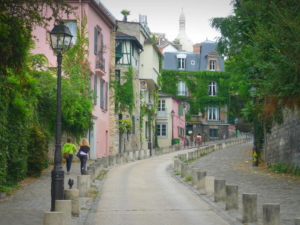A Day off the Island
They locked the dogs in the garage. The girl had put one dish with food and one with water inside for them, and then the man had bolted the door.
The rising sun stained the heavens above the hill red. Gnarled almond trees haunted the stony landscape. They shut the front door and got in the Renault 5 van. The girl turned around as they left the driveway, but the palms in the yard blocked the view of the garage. The house was dusky rose except for the white plastered extension, once a squash court but which now housed their horses. They had padlocked the green gate to the paddock. In the evening the old man from the stone house higher up the hill would come and feed them.
They had the sun in the rear view mirror, the man squinted as he drove along between the almond trees and stone walls. He lit another cigarette whenever he slowed down at the roundabouts outside the towns, there was hardly any traffic on the bypass.
They left the van in the airport car park. “Remind me I put the ticket in my jacket pocket,” he said. The girl nodded. “In fact, why don’t you keep it?” he said after taking another drag on his cigarette.
They checked in and sat at the bar. The girl suggested going through security first but he had already ordered a whisky. “All this frisking and interrogation makes me nervous,” he said.
“But you never drink in the morning,” the girl said.
“Mind your own business.”
The girl looked up to the departure board.
“Sorry,” he said.
She turned around and kissed him on the cheek. “Can we order café con leche and toast too?” she asked. “I’m starving.”
She fell asleep against his arm before they had reached cruising altitude. When the stewardesses handed out breakfast and drinks, he took another round of whisky. The girl slept deeply and innocently. Now and then he brushed a strand of hair from her forehead. In Madrid they stepped out of the airport terminal into a dry autumn heat, searching for the rental car. They didn’t find it at first, and he said the alphabetic ordering system didn’t make sense, gesticulating furiously at the corrugated roofs above the cars. Then he forgot his impatience again, they sat in the car and the girl navigated them around Madrid with the help of a map, and they laughed.
They drove for a long time, past estates of redbrick blocks of flats, and beyond the last of these the country started abruptly, hills and high plateaus with dark green bushes. After Ávila the landscape became flatter, the road pierced it straight as an arrow. At times not a single house could be seen far and wide, not even on the hills that appeared on the horizon. Oaks cast their shadows across scraggly grass and later, across lush meadows. The first bulls stood black in paddocks with short grass. “What a life,” the man said, “five years of paradise and with some luck a nice plump heifer or two.”
The girl rolled down the legs of her jeans. “Is this where Leon is from?” she asked.
“Exactly. Up in the mountains, the Leonese mastiff protects the sheep from the wolves. You couldn’t ask for a braver dog.”
“Our gentle little lion couldn’t fight any wolves with his velvet little paws.”
“Just you wait. Give him another couple months, when he’s full grown. Even now, he doesn’t want to sleep in the house anymore. These are dogs that have to bay at the moon.”
The village sign was inconspicuous, after a couple of farms they saw timber-framed houses and then the hotel. The young man at reception took their details with assiduous hospitality and accompanied them to the cramped elevator. It had a mirror and the girl rolled her eyes in it. The man smiled, looking at himself and furrowed his brow. The room had green drapes and two narrow beds. The girl dropped onto one of them. “Think we can push them together?” The man looked at the nightstand in the middle and shook his head. “Bolted down,” he said. “It’ll do you good for a change.” She shifted to the other bed, which he was now sitting on and taking his pack of cigarettes out of his shirt pocket. She took his face in both hands. It was still raw from shaving and from the white stubble missed. She kissed him on the lips. They returned the pressure, he placed a hand around her neck. Her vertebrae shifted under his fingers and he thought about how fragile life was.
Later, she was taking a bath while he smoked and gazed through the window into clouds that were drawing closer, laden with rain. The golden dawn on the island was distant now.
When she came back from the bathroom, she had powdered her face again and reapplied her eyeliner. It stirred him. What a beauty, he thought. The girl pulled a face, as she always did when she saw he was lost in her gaze, and then they left the room, one after the other. The estate agent was waiting for them down at reception. The man laid a hand on his shoulder in greeting. The girl shook his hand and kept behind the two of them as they stepped onto the street. It wasn’t so dead anymore, siesta was over. But in the pale light, villagers who could be seen moved along narrow pavements as if they had left their houses only by accident. The man and the estate agent turned into a side street which led downhill. Women dressed in black sat in front of their doorways. The first drops of rain plummeted from the low sky. The men stopped at a low door and the estate agent unlocked it. The man placed a hand on the girl’s back, motioning her to enter first. The women’s eyes followed them.
The ceilings were low and the plaster was flaking off the walls. Patches of mould stained them. There were pieces of wooden furniture, dark and damp-smelling. The kitchen cabinets were filled with porcelain cups and dusty glasses, on the table was a waxed tablecloth with a blue and yellow flower pattern. Behind the deep, well-worn chairs in the living room was a door that led outside. There was a longish plot of land with apple and cherry trees in the garden. The rain was heavier now. They walked through damp grass to a vegetable plot next to a wall, and the estate agent gestured back to the house. From here it was a dirty white wall with a single window and a low-slung slate roof. The man looked at the girl expectantly, his face full of hope. She looked past the house into the green treetops and the thick grass and tried to picture it. The man continued talking to the estate agent, who assured him that the deceased owners’ inheritors were in a hurry to sell and would certainly be open to negotiation. The girl waited inside the back door. When the man and the estate agent reached the house, she quickly walked ahead of them through the living room, past the windowless kitchen to the hall, where you thought you would hit your head on the ceiling. She turned around and saw the man duck his head instinctively. Yet he continued to puff away contentedly, questioning the estate agent questions, winning him over, like he could when he wanted to.
“Don’t you want to look back once more?” he asked the girl as she placed her hand on the handle to the front door. She looked at him probingly. “It’s not asking too much,” he said with the voice that she knew well. She walked through the house again, but he had already turned to the estate agent. His eyes didn’t follow her.
The women dressed in black sat under the eaves in front of the houses. The concrete their chairs were resting upon was light in contrast to the wet tarmac. On the main road they bid farewell to the estate agent, the man making a final request for a restaurant recommendation. Without first going to their room, they drove to the next village through a piece of woodland. This village was a tourist attraction, on the weekends people came to look at the timber-framed houses with their dark, heavy beams, and the towering cliffs in the background, and to buy manchego and jamón. The restaurant had crown glass windows and gingham cushions, there were sausages, smoked meats and noodles. It was too early for dinner, and it wasn’t the weekend, so the two of them sat almost alone. Their only company was an elderly couple seated at the other end of the room eating ham and raising glasses of sparkling wine.
“Well, what do you think?” the man said and drank some of his red wine.
“What should I think?” the girl answered. “What do you want with that house?”
“To live there.”
“Here? You’re not serious.?”
The man enjoyed a long sip.
“But how are you going to live here?” the girl continued. “How can we live here?”
The man gazed through the crown glass windows onto the narrow street with its restaurant signs. The girl lit a cigarette and sipped at her wine.
“I thought this was a getaway,” she said. “If I had known in advance…”
“What then?” he interrupted her. “What could you have known?”
The waitress placed a plate of pork chops in front of him, which he pounced on like an animal. The girl kept on smoking without touching her omelette.
“Eat, at least” he said eventually.
Each of them lay on their own bed. He had turned on the television attached to the ceiling. From time to time she glanced up from her book over to him, but he was staring at the television, hands folded across his chest. It was nearly dark; it was raining again. On their way back into the village the clouds had swallowed up the daylight. The spruces blurred together in the grove. He had not spoken since they had finished their meal.
“Let’s not fight over something silly,” she said. He looked straight ahead. “Who’s fighting?” he said.
At some point she fell asleep to the stupid voices of the television. When she woke up in the middle of the night, they were still talking and he was asleep. She turned off the television, drew the curtains against the light from outside and lay back down.
He didn’t speak during breakfast, in the small room next to reception, where they were brought toast, and roscones that they dunked into their coffee. He didn’t speak on the way to the car, and they sat together in silence for over an hour as he steered and lit a cigarette from time to time, the smoke slipping through his window, which was open a finger’s breath. The girl looked out the window at cows and oaks and plains, and there was that one thing that she shouldn’t have said, that and his unfairness.
He stopped for a break. He got out of the car without turning to look at her. For a while, she stayed in her seat. She would have liked to cry, but tears had become useless. So at some point she got out too and came and sat down next to him at a table in a corner of the empty diner.
“What do you want?” he asked. She looked at his black coffee, and her mouth felt bitter.
“Water,” she said, “why do you do this?”
“What?” he asked and smirked.
“This. So much wasted time.”
“No time spent with you is wasted. I like looking at you when you’re angry.”
“You didn’t look at me at all.”
“Oh yes I did, you just didn’t notice it.”
“You’re a rascal,” she repeated a sentence that echoed in her, and a moment later she remembered that it originally came from one of his former lovers. So young, you rascal, she had whispered in his ear as they ate dinner together with her husband, and with her, at a restaurant on the island. He had told her himself, and it had taken her aback and made her proud. She had considered his former lover striking – as mothers of children can be – but it was a strange feeling to be judged by her as a woman.
The afternoon heat glistened on the tarmac as the plane landed on the island. The car stood baking in the car park, they drove inland from the airport with the windows open. The radio was on, the girl sang along with a couple lines, and they both laughed. The man lit a cigarette, she took a puff, and hummed towards the open window.
The barking dogs bounded towards them in the drive. The tawny sheepdog jumped up against the door and then on the girl, who almost fell over under its weight. The other dog laid its muzzle in the girl’s hands. Then the two raced excitedly ahead to the horses, which were picking at straw in their stables and whinnied in anticipation of their evening fodder.
“How’d they get out of the garage?” the girl said.
The man looked at the tall wire mesh door. One of the corners of the wooden frame had been gnawed through at the bottom.
They took care of the horses, the dogs lay next to the hay bales and chewed on their bones. The girl stretched up to the highest of the bales to see if the hen had laid an egg. There was no egg, nor was the hen anywhere to be seen.
“Juan, have you seen Otto?” she asked the man.
“Can’t be far,” he said.
She went inside house, into the hall with the crooked bookshelves and opened the shutters on each side of the front door. The living room lay twilit before her. She opened the window over the kitchen range, pushing open the shutters and looking out for the hen, which liked to pick at the soil between the mint plants. Behind her, the man opened the fridge, took out a beer, and sat down at the wooden table.
“Otto is usually somewhere near the house,” she said.
The man took a sip from the can and looked at her. He stood up and went through the living room to the rear garage door. She followed him. She could already see the feathers from the steps, in a corner between heaps of clutter and feed sacks. The man looked up at her. It was oddly clean, only a dark spot on the earthen floor. All was quiet, no dust, no cackling and wing beats. The dogs poked their heads in from the gate, panting. They had never paid much attention to the hen until it had accidentally been locked in the garage with them.
Related Projects
Un día lejos de la isla
Un día lejos de la islaEncerraron a los perros en el garaje. La chica les dejó un cuenco con...
Aquí un mar, allá una fábrica
Aquí un mar, allá una fábricaMomar llamó desde Marrakech justo cuando me preparaba una ensalada...
Am Ende Nathalie
Am Ende NathalieAm Ende NathalieEine kleine Geschichte aus Paris, Teil eines Romans, dessen...
A House with Cherry Trees
A House with Cherry TreesThe car was parked at a fork in the road. The windows were rolled down,...
Der Kleiderbaum
Der KleiderbaumAn einer Weggabelung stand der Wagen. Die Fenster waren heruntergekurbelt, feuchte...
Comtesse de Sévigné auf Abwegen
Comtesse de Sévigné auf AbwegenÜber unserem Wohnzimmer, dem ausufernden Bücherregal, stand ein...





